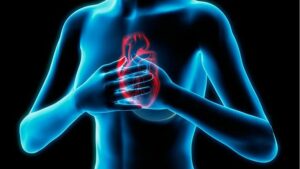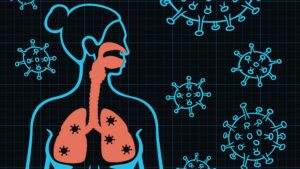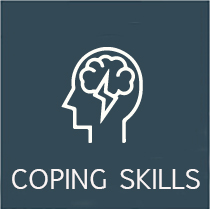Do you ever feel like stress is a weight on your chest? That tight, heavy feeling that makes it hard to breathe? Well, you’re not alone. stress can cause all sorts of problems in the body, including chest pain. In this blog post, we will discuss the connection between stress and chest pain, and what you can do to ease the tension in your chest.
Contents
Defining The Terms

Stress is the body’s response to any demand. It can come from an event or thought that makes you feel frustrated, angry, or nervous. Chest pain is one of the many symptoms of stress. While stress itself doesn’t cause chest pain, it can contribute to feelings of tightness, heaviness, or aching in your chest.
What Are The Risk Factors?
There are many different stressors that can cause stress and chest pain. Some common ones include:
Family Problems 
There are a number of ways that family problems can lead to stress and chest pain.
For example, if you are constantly arguing with your spouse or partner, this can lead to a build-up of stress and anxiety. This in turn can cause physical symptoms such as chest pain or tightness.
Alternatively, if you are caring for an elderly or sick relative, this can also be very stressful. The physical demands of caring for someone else, as well as the emotional stress of worry and guilt, can take their toll on your health and lead to chest pain.
Money Troubles
There are many ways that money troubles can result in stress and chest pain.
For example, if you are constantly worrying about how you’re going to pay your bills, or whether you’ll be able to keep up with your mortgage payments, this can lead to a great deal of stress. This stress can then manifest itself physically, in the form of chest pain.
Additionally, if you are constantly arguing with your spouse or partner about money matters, this can also lead to stress and chest pain. In short, any situation where you are feeling overwhelmed by financial worries can result in stress and chest pain.
Work Deadlines
When you have a lot of work deadlines, it can stress you out and cause chest pain.
For example, let’s say you’re a student, working on a project for school, studying for exams, and are also working part-time. This can be a lot to handle, and it may result in stress and chest pain.
Furthermore, a lot of workloads can also impact your mental health, which may lead to stress and anxiety. If you’re constantly worrying about deadlines and feeling overwhelmed, it can take a toll on your physical health as well. This can manifest in the form of chest pain, among other symptoms.
Relationship Issues
One of the most common things we see in our stress and chest pain clinic is people who are struggling with relationship issues. Stress and chest pain can be caused by a variety of things, but one of the most common culprits is stress.
For example, we often see people who are going through a divorce or a break-up. This is obviously a very stressful time, and it can result in chest pain. Also, those who are in abusive relationships often suffer from stress and chest pain.
Health Concerns
In some cases, stress and chest pain may be caused by a medical condition. For instance, if you have anxiety or panic disorder, you may experience stress and chest pain when you have an anxiety attack. Additionally, if you have heart disease, you may experience stress and chest pain during a heart attack.
How Does Stress Result In Chest Pain? 
The stress that we experience in our daily lives can take a toll on our bodies in many ways. One of the ways stress manifests itself is through chest pain. While stress itself doesn’t cause chest pain, it can aggravate other conditions that do lead to chest pain.
For example, if you have poor posture or slouch when you sit, this can put stress on your muscles and joints. This can lead to tension in the chest and pain. Additionally, stress can contribute to heartburn and indigestion by causing the stomach to produce more acid than usual. This extra acid can then irritate the lining of the stomach and esophagus, leading to chest pain.
Stress can also trigger a heart attack in people who have pre-existing heart conditions. When we experience stress, our bodies release hormones like adrenaline and cortisol. These hormones cause an increase in heart rate and blood pressure. This can put a strain on the heart and lead to chest pain.
Finally, stress can also cause or contribute to other problems like gastrointestinal issues, which can also lead to chest pain.
How Does Chest Pain Result In Stress? 
Chest pain can cause stress because it is a symptom of many different medical conditions, some of which are life-threatening. For example, chest pain is a symptom of heart attacks, pulmonary embolism, and aortic aneurysms.
Chest pain can also be caused by less serious conditions such as muscle strain or GERD. chest pain may contribute to stress because it is often accompanied by anxiety or fear.
When you experience chest pain, your first instinct may be to worry that something is seriously wrong. This can lead to a feeling of stress or anxiety. If the pain is severe, you may even feel panicked.
You are not able to think clearly and may feel like you are going to pass out. All of these reactions are normal when you experience chest pain. However, it is important to remember that not all chest pain is a sign of a heart attack or other serious condition. In many cases, chest pain is caused by something less serious, such as muscle strain or indigestion.
What Are The Consequences?
There are various harmful outcomes of stress and chest pain occurring together. Some very common consequences are as follows:
Increase In The Level Of Stress Hormones
When we experience stress, our body responds by releasing stress hormones like adrenaline and cortisol. These hormones increase our heart rate and blood pressure, which can lead to chest pain. In addition, stress can also cause us to tighten the muscles in our chest, which can also contribute to pain.
Tightness In The Chest Muscles
Stress causes the body to release hormones like cortisol, which can lead to an increase in heart rate and blood pressure. When these things happen, it can cause the chest muscles to tighten and lead to pain.
Stress can also make it difficult for the body to break down glucose, which the cells need for energy. This can lead to something called hypoglycemia, or low blood sugar, which can also cause chest pain. In some cases, stress may even trigger a heart attack.
An Increased Heart Rate
The victim experiences an increased heart rate, which in turn can cause chest pain. When we experience stress, our sympathetic nervous system is activated. This triggers the release of stress hormones like adrenaline and cortisol. These hormones increase our heart rate and blood pressure as part of the “fight-or-flight” response.
Weak Immune System
Stress and chest pain can have a number of negative effects on our health, including weakening our immune system. This can lead to more frequent infections and illnesses.
Your body may then be less able to fight off these infections and illnesses, leading to more stress and anxiety. In turn, this can create a vicious cycle of stress and illness.
One way that stress weakens our immune system is by increasing the levels of cortisol in the body. Cortisol is a hormone that helps us respond to stress, but it also suppresses our immune system. This means that when we’re under stress, we’re more likely to get sick.
How Can Therapies Help?
Taking therapies has immense benefits. If taken under proper guidance and followed by the right strategy, they give the desired results. Some of the common and useful therapies are:
Cognitive Behavioral Therapy
This type of therapy can help you identify and change negative thinking patterns that contribute to stress.
CBT is a type of psychotherapy that can help you manage stress and chest pain. This approach focuses on changing negative thoughts and behaviors. CBT can be an effective treatment for stress and chest pain because it helps you:
- identify stressors and unhealthy coping mechanisms
- learn new coping skills
- develop healthy thinking patterns
- change negative behaviors
With the help of a trained professional, you can learn how to better manage your stress and chest pain.
Exposure Therapy
This therapy may be used if your chest pain is caused by anxiety. It involves gradually exposing yourself to the things that trigger your anxiety, in a safe and controlled environment.
Exposure therapy helps people manage and overcome stress and anxiety by gradually exposing them to the things they fear in a safe and controlled environment. This type of therapy has been shown to be effective in treating a variety of conditions, including stress and anxiety disorders.
It works by helping people to confront their fears and learn new ways of coping with them. The therapist will work with the person to create a hierarchy of feared situations, from those that are least scary to those that are most frightening.
The person will then gradually be exposed to these situations in a safe and controlled environment, starting with the least scary situation and working up to the most frightening one. The goal is for the person to eventually be able to confront their fears without feeling overwhelmed by stress or anxiety.
Heat Therapy
This form of treatment helps improve circulation, which can in turn help to reduce stress and chest pain.
Heat therapy is one of the most popular natural treatments for stress and anxiety because it is so effective. When you use heat on your body, it causes your blood vessels to dilate, which helps to improve circulation.
Additionally, the heat helps to relax muscles, which can reduce stress and tension. Finally, the heat also increases endorphin levels in the brain, which can help to alleviate stress and pain. If you suffer from stress or anxiety, consider giving heat therapy a try.
Acupuncture
Acupuncture is an ancient Chinese healing practice that involves inserting thin needles into the body at specific points. This process stimulates the nervous system and releases endorphins, which can help to reduce stress and pain.
For example, acupuncture can help to release the tension in your chest and improve your overall circulation. This can ultimately help to reduce stress and ease any associated chest pain.
Acupuncture is a relatively safe treatment, and there are few side effects associated with it. However, it is important to consult with a licensed practitioner before undergoing any treatment.
Massage Therapy
This type of therapy can help to manage stress by reducing muscle tension, improving circulation, and promoting relaxation.
There are a few different types of massage techniques that can be used to help relieve stress and chest pain. A Swedish massage is a gentle form of massage that uses long strokes and kneading to relax the body. Deep tissue massage is a more intense form of massage that targets the deeper layers of muscle and connective tissue. Trigger point massage focuses on specific areas of tight muscle fibers that can cause pain in other parts of the body.
If you’re dealing with stress and chest pain, massage therapy may be a good option for you. Be sure to discuss your symptoms and health history with your massage therapist to ensure that they are using the best possible approach for you.
Relaxation Techniques
Relaxation techniques can be extremely helpful in managing stress and chest pain. They help to counter this response by calming the nervous system and promoting a sense of relaxation.
There are many different relaxation techniques that can be effective in reducing stress and chest pain. Some popular options include deep breathing exercises, progressive muscle relaxation, guided imagery, and yoga. Experiment with different techniques to see what works best for you. Your therapist may help you with this type of strategy by providing you with a relaxation CD or app.
How Can Self-Coping Strategies Help?
There are a number of self-coping strategies that can be used to manage and overcome stress and chest pain. Some of these include:
Identifying stressors and learning how to cope
Stress can cause chest pain, and chest pain can cause stress. Identifying stressors and learning how to avoid or cope with them help you manage and overcome stress and chest pain. Understanding the stress and chest pain connection can help you take control of your health.
Exercising regularly
When you exercise, it helps to improve your sleep quality, which can reduce stress levels.
Additionally, regular exercise can help to increase your overall energy levels and reduce fatigue. Finally, exercise has been shown to be beneficial for heart health, which can reduce the risk of chest pain.
Eating a healthy diet
When it comes to stress and chest pain, one of the best things you can do is eat a healthy diet. This means plenty of fruits, vegetables, whole grains, and lean protein. Eating these nutrient-rich foods helps your body to better cope with stress.
They also provide essential vitamins and minerals that can help reduce inflammation throughout your body, including in your chest. In addition, a healthy diet can help to improve your overall mood and energy levels, both of which can be negatively affected by stress.
Getting enough sleep
Getting enough sleep helps you manage stress by giving your body time to recover from the day’s events. It also helps you overcome stress by providing your body with the energy it needs to cope with difficult situations.
Additionally, sleep deprivation can make chest pain worse. So if you’re struggling with stress and chest pain, be sure to get plenty of rest.
Spending time in nature
Being in nature can help to take your mind off of whatever is causing you stress or anxiety. This can be a huge relief, especially if you’re struggling with chronic stress or anxiety.
Additionally, being in nature can help to reduce cortisol levels, which can further ease stress and tension. Finally, simply spending time outdoors has been shown to improve mood and increase feelings of well-being.
Indulging in household chores
It may seem like a hassle at first, but taking care of your home can actually help reduce stress and improve your overall health.
Keeping a tidy house can help you feel more organized and in control. This can be especially helpful if you’re dealing with a lot of stress in other areas of your life. Having a clean space to come home to can give you a sense of peace and calmness.
In addition, doing household chores can also be a great way to get some exercise. Even light activities like vacuuming or dusting can help increase your heart rate and release endorphins, improving your mood and reducing stress.
Spending time with your loved ones
When you’re going through tough times, it’s important to have a strong support system. That’s why spending time with your loved ones can be so helpful. They can offer you emotional and practical support, which can make a big difference when you’re dealing with stress and chest pain.
They can provide a listening ear when you need to vent about what’s going on. And just knowing that they’re there for you can be a huge source of comfort.
If you are married, your spouse can be a particularly valuable source of support. They understand you better than anyone and can offer practical and emotional help. If you don’t have a spouse, Lean on your parents, siblings, or close friends.
Giving time to your passion
When you invest time in activities that you enjoy, your stress levels naturally fall. This is because you’re no longer focused on the things that are causing you stress. Instead, you’re concentrating on something that makes you happy.
When your stress levels are lower, your chest pain will also lessen. So, if you’re looking for a way to manage and overcome stress and chest pain, make sure to give yourself some time each day to pursue your passions.
Conclusion
Stress and chest pain are interconnected. It is important to manage stress in order to avoid chest pain. There are many stress management techniques that can be useful in reducing stress levels.
Remember that stress is a normal part of life, but it’s important to manage it in order to avoid negative consequences like chest pain. There are many stress management techniques available, so find one that works for you and stick with it. And if you experience any chest pain, don’t hesitate to see a doctor.
To make your life meaningful, stress-free, and full of love, you have to be proactive and take control of stress. Very soon with the help of the right strategy, you can again live a stress-free life with a full heart.
For more information, please contact MantraCare. Stress can have both physical and mental effects on the body, leading to negative consequences such as anxiety, depression, and even physical illnesses. If you have any queries regarding Online Stress Counseling experienced therapists at MantraCare can help: Book a trial Stress therapy session








